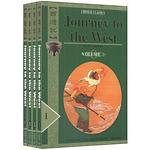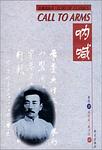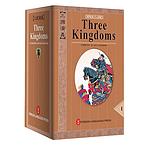The Greatest Chinese, Japanese "Fiction" Books of All Time
Click to learn how this list is calculated.
This list represents a comprehensive and trusted collection of the greatest books. Developed through a specialized algorithm, it brings together 305 'best of' book lists to form a definitive guide to the world's most acclaimed books. For those interested in how these books are chosen, additional details can be found on the rankings page.
Genres
Countries
Date Range
Reading Statistics
Click the button below to see how many of these books you've read!
Download
If you're interested in downloading this list as a CSV file for use in a spreadsheet application, you can easily do so by clicking the button below. Please note that to ensure a manageable file size and faster download, the CSV will include details for only the first 500 books.
Download-
1. The Tale of Genji by Murasaki Shikibu
"The Tale of Genji" is a classic work of Japanese literature from the 11th century, often considered the world's first novel. The story revolves around the life of Genji, the son of an emperor, exploring his political rise, romantic relationships, and the complex court life of the Heian era. The novel is celebrated for its detailed characterization and its analysis of the different forms of love.
The 155th Greatest Book of All Time -
2. The Wind-Up Bird Chronicle by Haruki Murakami
A man's search for his wife's missing cat evolves into a surreal journey through Tokyo's underbelly, where he encounters a bizarre collection of characters with strange stories and peculiar obsessions. As he delves deeper, he finds himself entangled in a web of dreamlike scenarios, historical digressions, and metaphysical investigations. His reality becomes increasingly intertwined with the dream world as he grapples with themes of fate, identity, and the dark side of the human psyche.
The 277th Greatest Book of All Time -
3. Never Let Me Go by Kazuo Ishiguro
The novel is a haunting tale of three friends, who grow up together at a seemingly idyllic English boarding school. As they mature, they discover a dark secret about their school and the purpose of their existence, which is to become organ donors for the rest of society. The story is a profound exploration of what it means to be human, the morality of scientific innovation, and the heartbreaking reality of love and loss.
The 387th Greatest Book of All Time -
4. Journey to the West by Wu Cheng'en
"Journey to the West" is a classic Chinese novel that follows the adventures of a Buddhist monk and his three disciples, a monkey, a pig, and a river monster, as they travel from China to India in search of sacred Buddhist scriptures. Along the way, they face a series of challenges and obstacles, including battling demons and overcoming their own personal weaknesses. This epic tale is a blend of mythology, folklore, and fantasy, and is also a commentary on the practice and principles of Buddhism.
The 490th Greatest Book of All Time -
5. Call to Arms by Xun Lu
"Call to Arms" is a collection of short stories that vividly capture the impact of the socio-political upheaval during the early 20th century in China. The narratives delve into the lives of ordinary people, predominantly the peasantry and the lower classes, who are often caught in the throes of societal change and struggle for survival. Through a blend of realism and symbolism, the stories explore themes of tradition versus modernity, the human condition, and the quest for justice, reflecting the author's critical engagement with the national and cultural issues of his time.
The 571st Greatest Book of All Time -
6. Dream of the Red Chamber by Cao Xueqin
"Dream of the Red Chamber" is a classic Chinese novel that provides a detailed, episodic record of life in the aristocratic Jia family. The story revolves around the love triangle between the family's heir, his sickly cousin, and his other cousin who is raised to be his wife. It is also a critique of the family's decline and a reflection on the societal norms of the time. The novel is famous for its vivid characterization and psychological depth, and its unique portrayal of Chinese society during the Qing dynasty.
The 586th Greatest Book of All Time -
7. The Temple of the Golden Pavilion by Yukio Mishima
This novel follows the life of a young man named Mizoguchi, who becomes an acolyte at a famous Zen temple in Kyoto. Mizoguchi is afflicted with a stutter and a severe inferiority complex, which leads him to develop a destructive obsession with the temple's beauty. As he struggles with his personal demons, his fixation escalates into a desire to destroy the temple. The book is a profound exploration of beauty, obsession, and the destructive nature of ideals.
The 614th Greatest Book of All Time -
8. Snow Country by Yasunari Kawabata
"Snow Country" is a poignant tale of a tragic love affair between a wealthy city-dweller and a provincial geisha. Set in a remote hot-spring town in the snowy Japanese mountains, the story explores the depth of human emotions, loneliness, and the ephemeral nature of beauty and love. The narrative is filled with vivid imagery and symbolism, reflecting the melancholic and transient beauty of the snow country, and the inevitable fate of the characters.
The 897th Greatest Book of All Time -
9. Norwegian Wood by Haruki Murakami
Set in Tokyo during the late 1960s, the novel follows a college student as he navigates a complex love triangle while grappling with his own mental health and the societal pressures of the time. He's torn between his love for a beautiful but emotionally troubled woman and his growing feelings for a lively, outgoing classmate. As he confronts his past, present, and future, the narrative explores themes of love, loss, and personal growth.
The 917th Greatest Book of All Time -
10. The Sea of Fertility by Yukio Mishima
"The Sea of Fertility" is a four-part epic that follows the life of Shigekuni Honda, a man who believes in reincarnation. The series spans several decades, beginning in the early 20th century and ending in the 1970s, and explores Japanese history, culture, and spirituality. As Honda encounters individuals he believes to be the reincarnations of his childhood friend, he grapples with questions of identity, mortality, and the nature of the soul.
The 941st Greatest Book of All Time -
11. Some Prefer Nettles by Junichiro Tanizaki
"Some Prefer Nettles" is a novel that explores the complexities of a failing marriage in early 20th century Japan. The main characters, a husband and wife, are both aware of their fading love for each other and are drawn to other people, but are hesitant to divorce due to societal pressures and the welfare of their young son. The novel also delves into the cultural tension between traditional Japanese customs and the encroaching influence of Western culture.
The 962nd Greatest Book of All Time -
12. Romance of the Three Kingdoms by Guanzhong Luo
"Romance of the Three Kingdoms" is a historical novel set in the turbulent years towards the end of the Han dynasty and the Three Kingdoms period in Chinese history, starting in 169 AD and ending with the reunification of the land in 280. The story, part historical, part legend, and part mythical, romanticizes and dramatizes the lives of feudal lords and their retainers, who tried to replace the dwindling Han dynasty or restore it. The novel deals with the plots, personal and military battles, intrigues, and struggles of these states to achieve dominance for almost 100 years.
The 1043rd Greatest Book of All Time -
13. Rashomon and Seventeen Other Stories by Ryunosuke Akutagawa
"Rashomon and Seventeen Other Stories" is a collection of narratives that delve into the depths of human nature, exploring themes such as morality, truth, and the complexities of the human psyche. The stories, set in various periods of Japanese history, range from tales of ancient samurai to accounts of disturbing personal experiences, offering a rich and diverse exploration of Japanese culture and society. The title story, "Rashomon," is a psychological examination of a servant's moral dilemma during a time of civil unrest.
The 1050th Greatest Book of All Time -
14. Thousand Cranes by Yasunari Kawabata
"Thousand Cranes" is a story set in post-war Japan, revolving around the life of a young man who is entangled in a complex relationship with three women. These women are linked to his deceased father and a shared tea ceremony set, symbolizing the cultural and generational tensions that exist. The narrative explores themes of love, loneliness, tradition, and the haunting burden of the past.
The 1085th Greatest Book of All Time -
15. The Water Margin: Outlaws of the Marsh by Shi Naian
"The Water Margin: Outlaws of the Marsh" is a classic Chinese novel set during the Song dynasty, revolving around 108 outlaws who gather at Mount Liang to form a sizable army. The narrative explores themes of rebellion, loyalty, and justice, as these bandits challenge the corrupt and oppressive government. Despite their status as outlaws, they follow a strict code of honor and righteousness, often assisting the poor and the weak. The book is a blend of history, folklore, and mythology, offering a vivid portrayal of the political and social dynamics of the era.
The 1156th Greatest Book of All Time -
16. Kokoro by Sōseki Natsume
"Kokoro" is a novel that delves into the complexities of human relationships and the changing cultural climate of Japan at the turn of the 20th century. The story is narrated by a young university student who forms an unlikely friendship with an older man, referred to only as "Sensei". As their bond deepens, the young man learns of Sensei's tragic past, his feelings of guilt and regret, and his struggle to find peace. The novel explores themes of loneliness, betrayal, and the moral dilemmas of modern life.
The 1159th Greatest Book of All Time -
17. Silence by Shūsaku Endō
"Silence" is a historical novel set in the 17th century, which follows a Portuguese Jesuit missionary who travels to Japan to comfort local Christians and find his mentor, who is rumored to have renounced his faith. The protagonist experiences the brutal persecution of Christians by the Japanese government, and grapples with the silence of God in the face of suffering. The narrative explores themes of faith, doubt, cultural clash, and the human capacity for both cruelty and endurance.
The 1161st Greatest Book of All Time -
18. The Makioka Sisters by Junichiro Tanizaki
"The Makioka Sisters" is a novel set in pre-World War II Japan, following the lives of four sisters from a once-wealthy Osaka family. The story focuses on their struggles to maintain their traditional lifestyle and status in a rapidly changing society. The two elder sisters are concerned with finding a suitable husband for the third sister, while the youngest sister, more modern and independent, resists the constraints of her family's expectations. The book provides a detailed and nuanced exploration of the clash between tradition and modernity in Japanese society.
The 1358th Greatest Book of All Time -
19. Rickshaw Boy by Lao She
"Rickshaw Boy" is a novel about a young man living in Beijing in the 1920s who struggles to escape poverty and achieve personal independence. Despite his hard work and determination, he is continuously set back by societal and personal misfortunes, including failed business ventures, a disastrous marriage, and the loss of his rickshaw. The book serves as a critique of traditional Chinese society, illustrating the harsh realities of life for the working class during this time period.
The 1389th Greatest Book of All Time -
20. The Twilight Years by Sawako Ariyoshi
"The Twilight Years" is a poignant story revolving around the life of a middle-aged woman who is burdened with the responsibility of taking care of her ageing and ailing father-in-law while trying to balance her work and personal life. The novel explores the themes of old age, family responsibilities, societal expectations, and the struggles of women in a patriarchal society. It offers a critical examination of the social, cultural, and personal issues related to aging and care-giving in post-war Japan.
The 1486th Greatest Book of All Time -
21. Waiting by Ha Jin
"Waiting" is a story set in China during the Cultural Revolution and its aftermath, revolving around the life of Lin Kong, a military doctor who is torn between his love for two women. He is stuck in an arranged marriage with his traditional wife in the countryside, while he falls in love with a modern, city nurse. The novel explores his 18-year struggle to divorce his wife and marry his lover, depicting the clash between traditional and modern Chinese culture, personal desires, and societal expectations.
The 1539th Greatest Book of All Time -
22. The Sound of the Mountain by Yasunari Kawabata
The novel centers around an aging businessman who, upon hearing nightly sounds from the nearby mountain, begins to confront his own mortality and the complexities within his family. As he navigates his strained relationship with his wife, his adulterous son, and his daughter-in-law whom he harbors feelings for, he experiences a profound sense of solitude and existential dread. The narrative subtly explores themes of aging, alienation, and the ephemeral nature of life.
The 1557th Greatest Book of All Time -
23. The Tale of the Bamboo Cutter by Unknown
"The Tale of the Bamboo Cutter" is a classic piece of Japanese literature that follows the story of a bamboo cutter who finds a tiny girl inside a glowing bamboo stalk. The girl grows into a beautiful and desirable woman, attracting numerous suitors including the emperor. However, she reveals that she is not from Earth, but from the moon and is eventually taken back, leaving the bamboo cutter and her suitors heartbroken. The tale is a poignant exploration of love, loss, and the transient nature of beauty.
The 1620th Greatest Book of All Time -
24. A Wild Sheep Chase by Haruki Murakami
A Wild Sheep Chase follows the story of a recently divorced advertising executive in Tokyo who is given a mysterious assignment by a sinister, powerful man: to find a particular sheep with a star-shaped birthmark. This mission leads him to travel across the snowy landscapes of Northern Japan, crossing paths with peculiar characters, and exploring themes of loneliness, fate, and identity. The narrative is a blend of detective story, postmodern critique, and surreal journey, infused with the author's unique style of magical realism.
The 1740th Greatest Book of All Time -
25. The Box Man by Kobo Abé
"The Box Man" is a surreal narrative about a man who chooses to live as a homeless individual, inside a box, in Tokyo. The protagonist, a former doctor, narrates his experiences and observations from within the box, and the narrative often blurs the line between reality and hallucination. The book is a philosophical exploration of identity, anonymity, and the nature of existence, challenging the reader's perception of what it means to be an individual in society.
The 1930th Greatest Book of All Time
Reading Statistics
Click the button below to see how many of these books you've read!
Download
If you're interested in downloading this list as a CSV file for use in a spreadsheet application, you can easily do so by clicking the button below. Please note that to ensure a manageable file size and faster download, the CSV will include details for only the first 500 books.
Download























